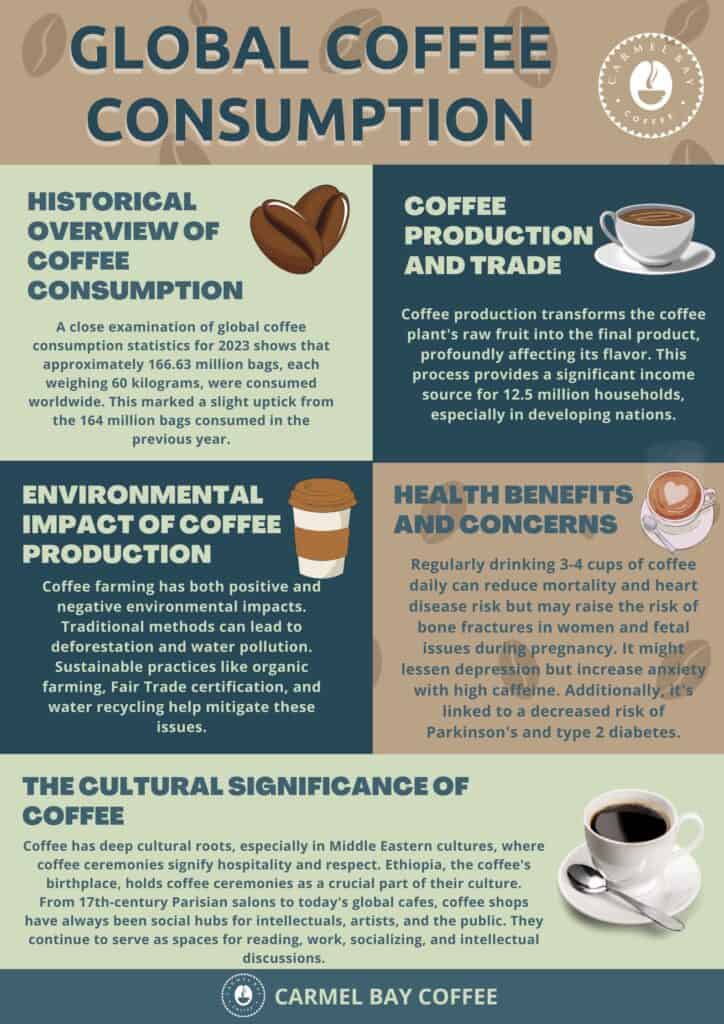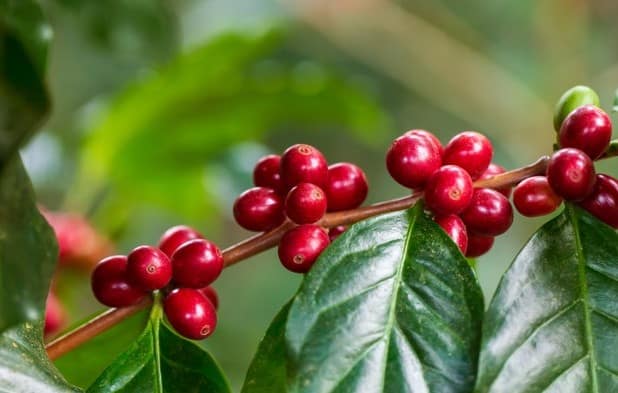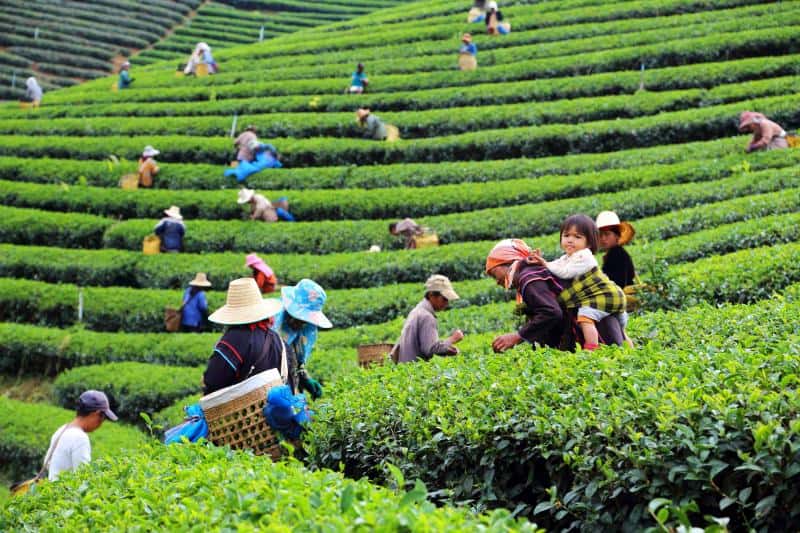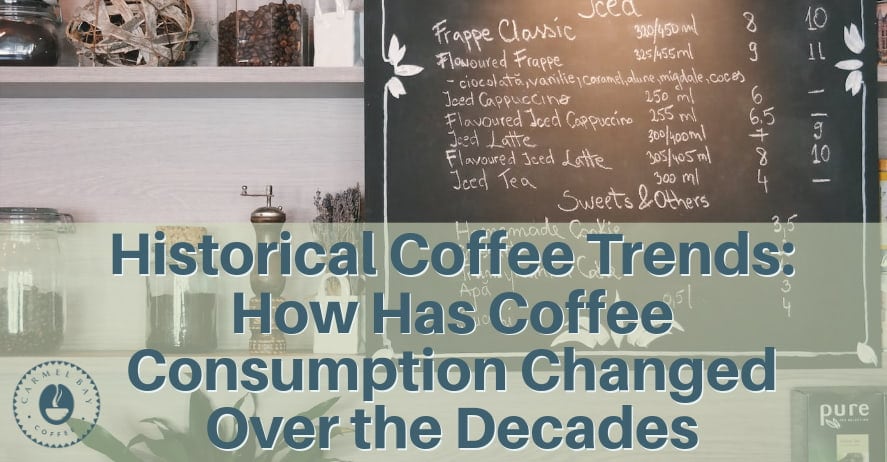The global coffee consumption trend shows just how deep the world’s love for coffee runs.. From the bustling streets of New York to the serene landscapes of Ethiopia, coffee remains a beloved beverage, uniting cultures and people.
Historical Overview of Coffee Consumption

The surge in coffee consumption over the years has been nothing short of phenomenal. As societies evolved, so did their love for this aromatic beverage, making it a staple in many households today.
Coffee Consumption in 2023

A detailed look into global coffee consumption numbers reveals that in 2023, around 166.63 million 60 kilogram bags of coffee were consumed worldwide. This was a slight increase from the 164 million bags consumed in the previous year.
Innovations in the Coffee Industry The coffee industry never ceases to amaze with its innovative brewing methods. Single-cup brewers, for instance, have become a favorite for many.
These devices offer a quick and mess-free coffee brewing method, especially when one desires just a single cup. Brands like Keurig Green Mountain have become household names in the United States, leading the single-cup coffee market.
Another notable innovation is cold brew coffee. Made by brewing coffee in cold or room temperature water for 12 to 24 hours, it offers a mellower and less acidic taste. Its popularity has skyrocketed recently, becoming a common menu item in many coffee shops.
The Market Value of Cold Brew Coffee Currently, the market for cold brew coffee stands at a whopping 321 million U.S. dollars. However, projections indicate that by 2023, this value could escalate to an impressive 1.37 billion U.S. dollars.
Coffee Consumption Patterns Across Continents Different continents have varied coffee consumption habits. While some prefer their coffee black and strong, others lean towards creamier and sweeter versions. These differences often reflect cultural preferences and historical influences.
The Impact of Coffee on the Economy Coffee isn’t just a beverage; it’s an economic powerhouse. From the farmers who cultivate the beans to the baristas who serve the final cup, coffee plays a pivotal role in driving economic growth in many regions.
Coffee Production and Trade

Coffee production is a complex process that involves converting the raw fruit of the coffee plant into the finished coffee. This process has a significant impact on the flavor of the roasted and brewed coffee. Coffee production is a major source of income for 12.5 million households, especially in developing countries.
Leading coffee-producing countries
Brazil, Vietnam, and Colombia are among the top coffee-producing countries in the world. Brazil alone accounts for about a third of the world’s coffee, making it the largest producer. The specific regions within these countries, such as Minas Gerais in Brazil, are renowned for their coffee production due to their ideal climate and altitude.
Global coffee trade dynamics
Various factors, including climate changes, political situations, and market demands influence the global coffee trade. Countries like Brazil and Vietnam significantly influence global coffee prices due to their large production volumes. Additionally, organizations like the International Coffee Organization (ICO) play a pivotal role in establishing agreements and standards for the global coffee trade.
If you’re curious about how our current coffee culture has been shaped over time, take a journey through the past with our article on Historical Coffee Trends: How Has Coffee Consumption Changed Over the Decades? It’s a captivating look at the ebb and flow of coffee’s popularity and influence through the ages.
Environmental Impact of Coffee Production

Coffee farming has both positive and negative impacts on the environment. While it provides a livelihood for millions, it can also lead to deforestation and water pollution if not managed sustainably.
The ecological footprint of coffee farming
Traditional coffee farming can lead to deforestation, which affects biodiversity and contributes to climate change. The use of pesticides and fertilizers can also pollute water sources. However, shade-grown coffee, a more traditional method of growing coffee under the canopy of trees, can help conserve biodiversity.
Sustainable coffee production practices
Many producers are turning to sustainable practices to combat the negative environmental impacts of coffee farming. This includes organic farming, which avoids the use of synthetic pesticides and fertilizers, and Fair Trade certification, which ensures that farmers receive a fair price for their beans and adhere to environmental and social standards.
Additionally, water recycling methods are being employed to reduce the pollution of freshwater sources.
Health Benefits and Concerns
The pros and cons of regular coffee consumption
Pros:
- General Health: A 2017 umbrella review of meta-analyses found that drinking coffee is generally safe within usual levels of intake and is more likely to improve health outcomes than to cause harm at doses of 3 or 4 cups of coffee daily.
- Mortality: In 2012, the National Institutes of Health–AARP Diet and Health Study found that higher coffee consumption was associated with a lower risk of death. Another study in 2014 found that coffee consumption was inversely associated with all-cause mortality.
- Cardiovascular Disease: Moderate coffee consumption is not a risk factor for coronary heart disease, as this study indicates. Drinking 3 to 5 cups of non-decaffeinated coffee daily reduces cardiovascular disease risk, as shown in this research.
Cons:
- Bone Health: There’s a possible increased risk in women having bone fractures, as highlighted in the 2017 umbrella review.
- Pregnancy: There’s a potential increased risk in fetal loss or decreased birth weight during pregnancy for regular coffee drinkers, as mentioned in the same review.
Coffee’s role in mental and physical health
- Mental Health: The UK National Health Service advises that avoiding coffee may reduce anxiety. High doses of caffeine, typically greater than 300 mg, can both cause and worsen anxiety, as discussed in this article. However, preliminary research indicates a beneficial relationship between coffee intake and reduced depression.
- Physical Health: Long-term coffee consumption is associated with a lower risk of Parkinson’s disease, as mentioned in the 2017 umbrella review. Additionally, every additional cup of caffeinated and decaffeinated coffee consumed in a day was associated, respectively, with a 9% and 6% lower risk of type 2 diabetes, as shown in this study.
For those of you hungry for more data-driven insights into the world of coffee, dive deeper with our dedicated article on Coffee Statistics. It’s packed with fascinating numbers and trends that every coffee enthusiast will appreciate.
The Cultural Significance of Coffee
| Country/Culture | Ritual/Ceremony Name | Brief Description |
|---|---|---|
| Ethiopia | Buna Ceremony | A traditional Ethiopian coffee ceremony that involves roasting green coffee beans, grinding them, and brewing the coffee in a special pot called a jebena. It’s a social event that can take several hours. |
| Turkey | Turkish Coffee Ritual | Coffee is finely ground and brewed with water and sugar in a special pot called ‘cezve’. It’s often served with a sweet treat and is known for its strong taste and thick consistency. |
| Sweden | Fika | A Swedish tradition of taking a break, usually in the afternoon, to enjoy coffee and pastries with friends or colleagues. It’s more about socializing than just drinking coffee. |
| Italy | Espresso Ritual | Italians enjoy their espresso standing up at local coffee bars. It’s a quick ritual, often enjoyed multiple times a day, especially after meals. |
| Saudi Arabia | Gahwa Ceremony | Traditional Arabic coffee, called ‘gahwa’, is lightly roasted and flavored with cardamom. It’s served in small cups without sugar and is often accompanied by dates. |
Coffee in rituals and ceremonies
Coffee has been an integral part of various cultures for centuries. Coffee ceremonies are a significant part of social life in many Middle Eastern cultures. The preparation, serving, and consumption of coffee in these ceremonies are ritualistic and symbolize hospitality and respect. In Ethiopia, the birthplace of coffee, the coffee ceremony is an essential part of their cultural and social life.
The social aspect of coffee consumption
For centuries, coffee shops or “cafés” have been social hubs in many countries. From the literary salons of 17th-century Paris to the modern-day coffee shops worldwide, these establishments have served as meeting places for intellectuals, artists, and the general public. Today, coffee shops remain spaces where people gather to read, work, socialize, and discuss ideas.
Wrapping Up Global Coffee Consumption
Coffee is more than just a morning pick-me-up. It’s a shared experience that bridges cultures, fuels conversations, and creates moments. From its role in age-old rituals to its impact on economies and the environment, coffee’s influence is undeniable.
As we’ve explored its journey and significance, it’s clear that our global love for coffee is here to stay. Whether it’s a simple cup to start the day or a cherished tradition, coffee continues to unite us in surprising and beautiful ways.


